บทความ
Jito (JTO) ปลดล็อกศักยภาพของ Solana ด้วย Liquid Staking ที่มาพร้อมประสิทธิภาพสูงสุดด้วย Maximum Extractable Value (MEV)
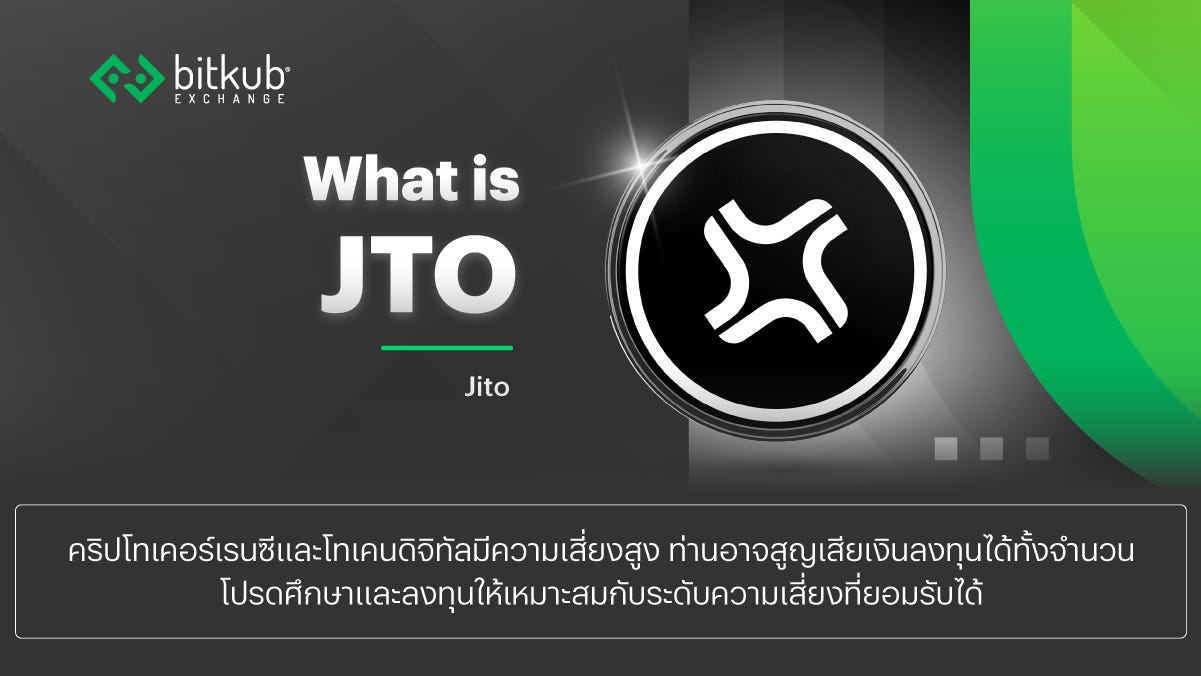
บล็อกเชน Solana เติบโตอย่างรวดเร็วและกลายเป็นหัวใจสำคัญของแอปพลิเคชันแบบกระจายศูนย์ ด้วยความเร็วในการประมวลผลที่สูงและค่าธรรมเนียมการทำธุรกรรมที่ต่ำ Jito ซึ่งเป็นโปรโตคอล Liquid Staking ได้เข้ามามีบทบาทสำคัญในระบบนิเวศที่กำลังพัฒนาอย่างต่อเนื่องของ Solana โดยมีความโดดเด่นในการจัดการกับความท้าทายที่ซับซ้อนที่สุดอย่างหนึ่งของบล็อกเชน คือ Maximal Extractable Value (MEV) Jito ไม่เพียงแต่เพิ่มประสิทธิภาพในการ Staking เท่านั้น แต่ยังนำเสนอกลไกเฉพาะตัวในการแบ่งปันผลกำไรจาก MEV ให้กับผู้ใช้ ทำให้เป็นผู้เล่นคนสำคัญสำหรับผู้ที่ชื่นชอบคริปโตและผู้ที่สนใจเทคโนโลยี DeFi ที่ล้ำสมัย
Jito (JTO) คืออะไร?
Jito คือโปรโตคอล Liquid Staking ที่สร้างขึ้นบนเครือข่าย Solana ช่วยให้ผู้ใช้สามารถ Staking โทเคน Solana (SOL) ของตน และได้รับ JitoSOL กลับมา แตกต่างจากการ Staking แบบดั้งเดิมที่สินทรัพย์จะถูกล็อกไว้ สำหรับ JitoSOL เป็น โทเคน Liquid Staking (LST) หมายความว่าโทเคนนี้เป็นตัวแทนของ SOL ที่คุณ Staking ไว้และรางวัลที่ได้รับ แต่ยังคงสามารถเข้าถึงเพื่อใช้งานในโปรโตคอล DeFi ต่างๆ บน Solana ได้ ผู้ใช้สามารถนำ JitoSOL ไปใช้ในการให้ยืม (Lending), การกู้ยืม (Borrowing), การจัดหาสภาพคล่อง (Liquidity Provision) และ Yield Farming ได้อย่างมีประสิทธิภาพ ทำให้เงินทุนของพวกเขาสามารถสร้างผลตอบแทนได้หลายชั้นพร้อมกัน
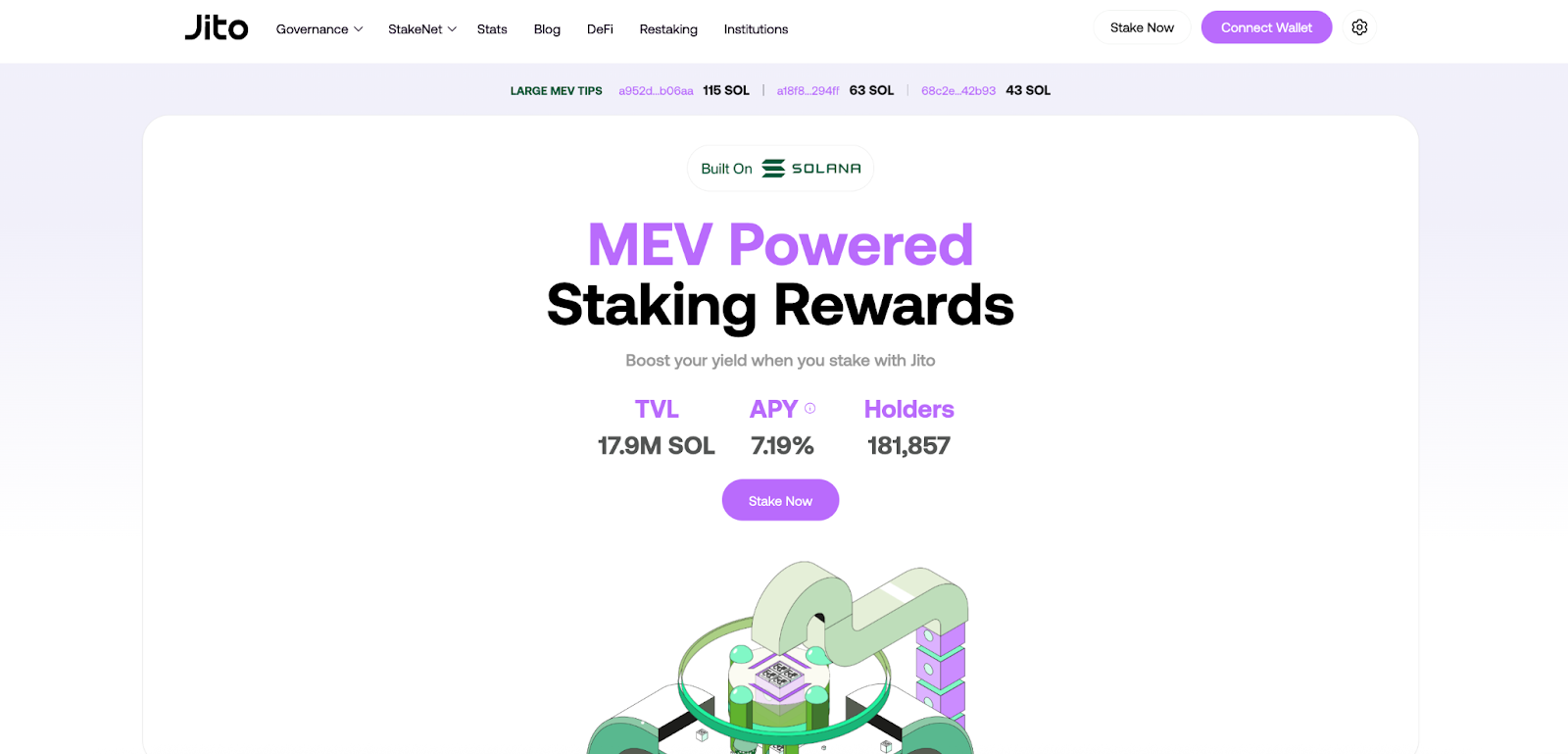
คุณสมบัติโดดเด่นของ Jito
คุณสมบัติเด่นของ Jito ส่วนใหญ่เกี่ยวข้องกับนวัตกรรมในการจัดการ MEV (Maximal extractable value คือ ค่าสูงสุดที่นักขุดหรือผู้ตรวจสอบ สามารถได้รับจากการรวม เรียงลำดับใหม่ หรือ การยกเว้นธุรกรรมภายในบล็อก) และความมุ่งมั่นในการกระจายอำนาจ ประกอบด้วย
— การเพิ่มประสิทธิภาพจาก MEV และการจัดสรร: MEV เป็นส่วนหนึ่งที่โดดเด่นที่สุดของ Jito MEV หมายถึงค่าสูงสุดที่ Validator สามารถดึงออกมาได้โดยการจัดลำดับ, การรวม, หรือการยกเว้นธุรกรรมภายในบล็อก บน Solana สิ่งนี้มักนำไปสู่ความแออัดของเครือข่าย
ทาง Jito จัดการปัญหานี้โดยใช้ระบบการประมูลที่ “Searcher” (ผู้ทำ Arbitrage, ผู้ชำระบัญชี) จะประมูลสิทธิ์ในการรวมลำดับธุรกรรมที่ทำกำไรได้ ส่วนหนึ่งของ MEV เหล่านี้จะถูกแจกจ่ายกลับไปยังผู้ถือ JitoSOL ซึ่งเป็นผลตอบแทนเพิ่มเติมจากรางวัล Staking มาตรฐาน ระบบนี้มีเป้าหมายเพื่อลดการสแปมเครือข่ายที่เกิดจากความพยายามในการทำ MEV front-running
— Liquid Staking ด้วย JitoSOL: ลักษณะที่เป็น Liquid ของ JitoSOL นำเสนอประสิทธิภาพของเงินทุนที่ไม่มีใครเทียบได้ แทนที่จะล็อก SOL ไว้ ผู้ใช้จะได้รับโทเคนที่ยังคงได้รับรางวัลจากการ Staking และ MEV ในขณะที่ยังคงสามารถนำไปใช้ในระบบนิเวศ DeFi ของ Solana ได้ อัตราแลกเปลี่ยนของ JitoSOL ต่อ SOL จะเพิ่มขึ้นอย่างต่อเนื่องเมื่อมีการสะสมรางวัล ทำให้มูลค่าเพิ่มขึ้นโดยอัตโนมัติสำหรับผู้ถือ
— การกระจายอำนาจผ่าน StakeNet: Jito มุ่งมั่นที่จะส่งเสริมเครือข่าย Solana ที่มีการกระจายอำนาจมากขึ้น โปรแกรม StakeNet ของ Jito จะมอบ SOL ที่ถูก Staking ให้กับกลุ่ม Validator ที่มีประสิทธิภาพสูงอย่างชาญฉลาด เพื่อป้องกันการกระจุกตัวของ Stake และเพิ่มความแข็งแกร่งของเครือข่าย ผู้จัดการ Stake Pool แบบอิสระนี้ใช้ Validator History Program และ Steward Program เพื่อประเมินและจัดอันดับ Validator เพื่อให้แน่ใจว่ามีการจัดสรร Stake ที่เหมาะสมที่สุด
— ลดความแออัดของเครือข่าย: ด้วยการแนะนำกลไกการประมูล MEV ที่มีประสิทธิภาพ Jito ช่วยลด “ธุรกรรมสแปม” ที่อาจเกิดขึ้นจากความพยายามในการจับ MEV ซึ่งจะช่วยให้เครือข่าย Solana ราบรื่นและมีประสิทธิภาพมากขึ้น

ผู้ก่อตั้ง Jito
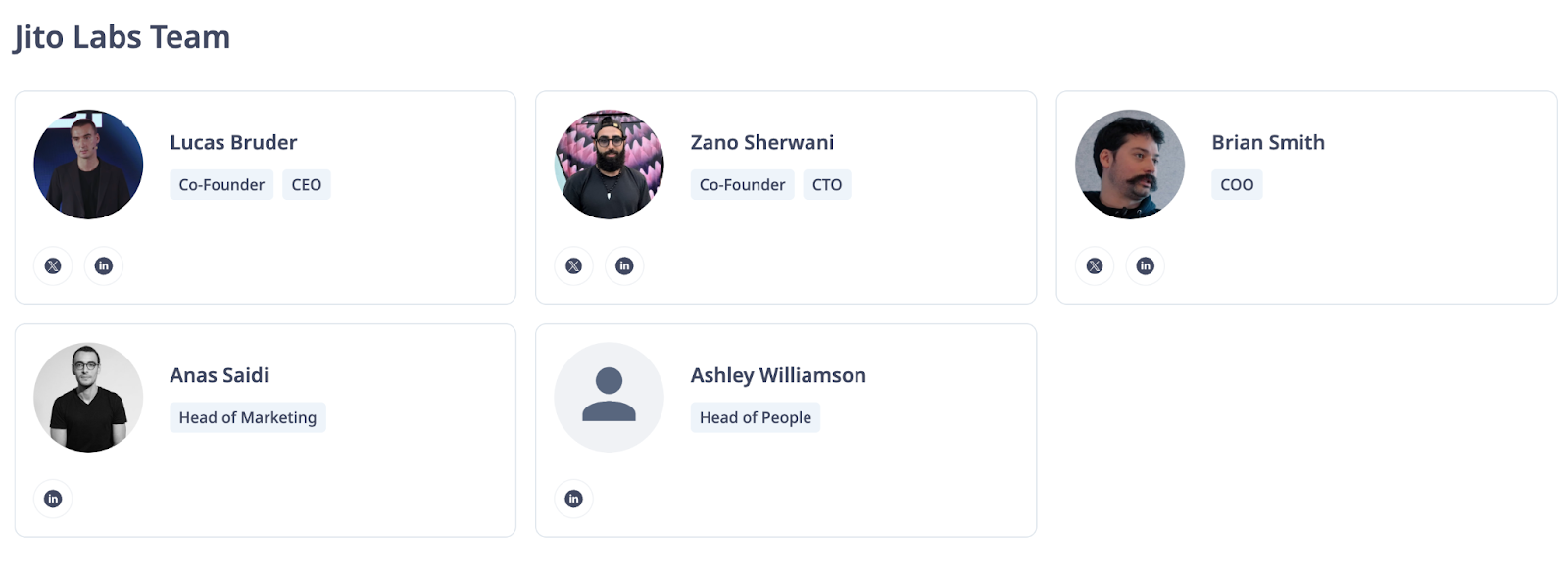
Jito ก่อตั้งโดย Lucas Bruder และ Zano Sherwani จากการตระหนักถึงศักยภาพของ MEV ในเครือข่ายบล็อกเชนที่เติบโตอย่างรวดเร็วเช่น Solana และความปรารถนาที่จะสร้างโครงสร้างพื้นฐานที่เพิ่มประสิทธิภาพในการจับและกระจาย MEV เพื่อประโยชน์ของ Staker และสุขภาพของเครือข่าย
JTO Token คืออะไร?
โทเคน JTO เป็น Governance Token ของ Jito Network มันมอบอำนาจให้ผู้ถือสามารถมีส่วนร่วมโดยตรงในการกำกับดูแลแบบกระจายอำนาจของโปรโตคอล ซึ่งรวมถึง:
— การกำหนดค่าธรรมเนียม: ผู้ถือ JTO สามารถลงคะแนนเสียงเกี่ยวกับโครงสร้างค่าธรรมเนียมของ JitoSOL stake pool
— การอัปเดตกลยุทธ์การมอบอำนาจ: พวกเขาสามารถแสดงความคิดเห็นในการมอบหมาย SOL ให้กับ Validator ผ่านโปรแกรม StakeNet
— การจัดการคลัง: ผู้ถือ JTO บริหารจัดการคลังโทเคน JTO ที่ถือโดย Jito DAO
— การพัฒนาโปรโตคอล: พวกเขามีส่วนร่วมในการเติบโตและการปรับปรุงผลิตภัณฑ์และโปรโตคอลต่างๆ ของ Jito อย่างต่อเนื่อง
โดยพื้นฐานแล้ว โทเค็น JTO ให้สิทธิ์แก่สมาชิกชุมชนในการแสดงความคิดเห็นในการกำหนดทิศทางและนโยบายในอนาคตของ Jito Network
การจัดสรรโทเคนและ Tokenomics
โทเคน JTO มีอุปทานรวมจำกัดอยู่ที่ 1,000,000,000 JTO กลยุทธ์การจัดสรรได้รับการออกแบบมาเพื่อส่งเสริมการเติบโตของชุมชน การพัฒนา Ecosystem และให้รางวัลแก่ผู้มีส่วนร่วมและนักลงทุนในช่วงแรก โดยมีกำหนดการ Vesting เพื่อให้แน่ใจถึงการมีส่วนร่วมในระยะยาว
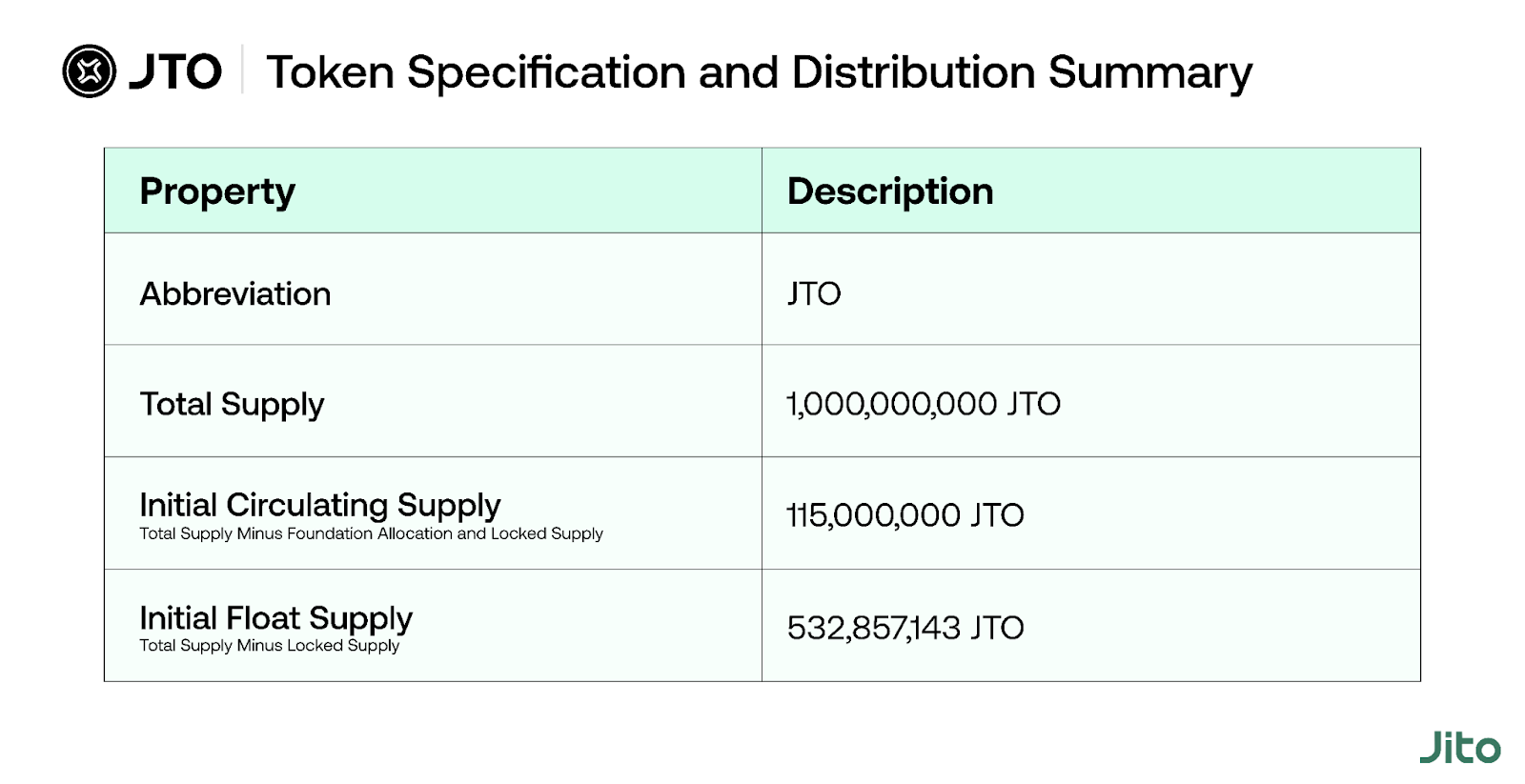
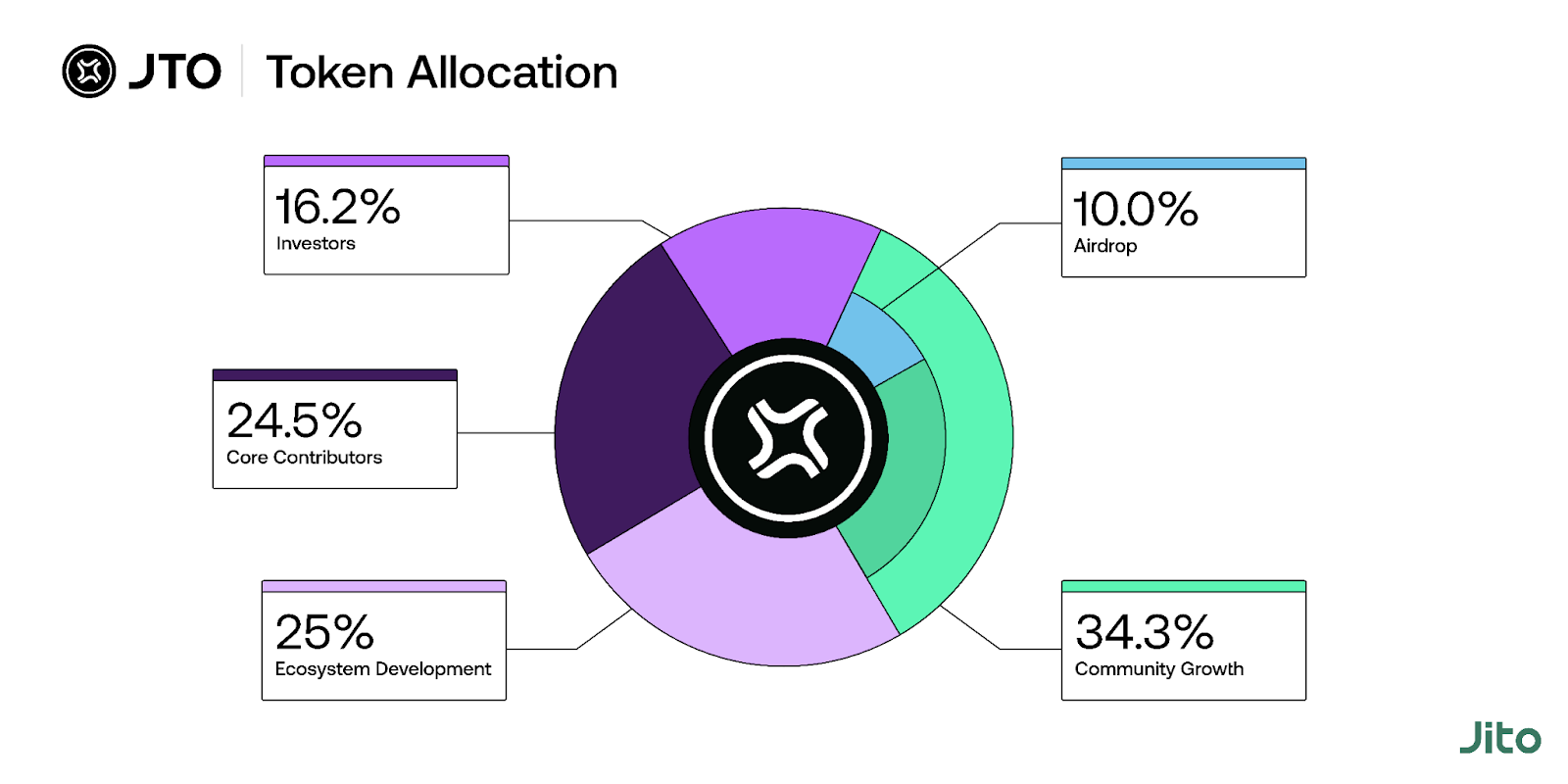
การจัดสรรหลักประกอบด้วย:
— การเติบโตของชุมชน 34.3% ของอุปทานทั้งหมดถูกจัดสรรให้กับการเติบโตของชุมชน Jito ซึ่งรวมถึงการแจกจ่าย Airdrop ย้อนหลัง 10% ให้กับผู้ใช้และผู้มีส่วนร่วมในช่วงแรก โดยส่วนที่เหลือจะถูกควบคุมโดย DAO เพื่อริเริ่มในอนาคต
— การพัฒนา Ecosystem 25% ของอุปทานถูกจัดสรรเพื่อสนับสนุนชุมชนและผู้มีส่วนร่วมที่ขับเคลื่อนการขยายโปรโตคอลของ Jito บน Solana รวมถึงความก้าวหน้าอย่าง StakeNet
— ผู้มีส่วนร่วมหลัก 24.5% ถูกจัดสรรให้กับผู้ก่อตั้ง Jito, พนักงานปัจจุบันและอนาคต, และผู้มีส่วนร่วมในช่วงแรกของ Ecosystem โทเคนเหล่านี้มักมีกำหนดการ Vesting โดยส่วนใหญ่มักมี cliff 1 ปี และปลดล็อกเป็นเส้นตรงในช่วง 2–3 ปี
— นักลงทุน 16.2% ถูกจัดสรรให้กับนักลงทุนที่สนับสนุนการพัฒนาในช่วงแรกของ Jito โทเคนเหล่านี้ก็เป็นไปตามกำหนดการ Vesting ที่คล้ายกับผู้มีส่วนร่วมหลัก โดยมี cliff 1 ปี และปลดล็อกเป็นเส้นตรงในช่วง 2–3 ปี
Tokenomics มีเป้าหมายเพื่อส่งเสริม Ecosystem ที่ยั่งยืนและมีการกระจายอำนาจ ซึ่งผู้มีส่วนได้ส่วนเสียจะได้รับแรงจูงใจให้มีส่วนร่วมในความสำเร็จระยะยาวของเครือข่าย การปล่อยโทเค็นจะถูกแบ่งออกเป็นช่วงๆ ผ่านระยะเวลา Vesting เพื่อป้องกันการขายจำนวนมากและส่งเสริมการกระจายอำนาจการกำกับดูแลอย่างค่อยเป็นค่อยไป
ข้อมูลน่าสนใจด้านราคาของ JTO
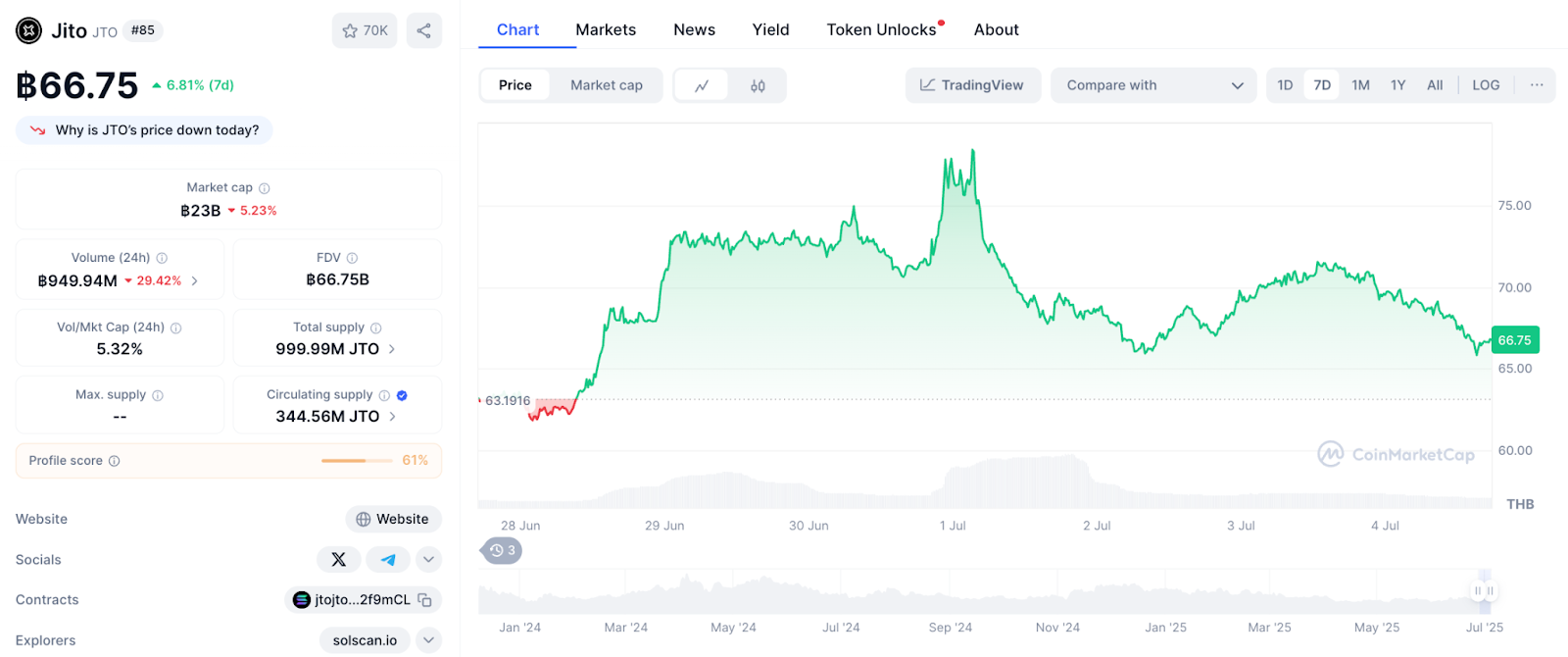
ข้อมูลจากเว็บไซต์ CoinMarketCap เมื่อวันที่ 4 ก.ค. 2025 เหรียญ JTO มีมูลค่าตามราคาตลาด (Market cap) ที่ 711,433,258 ดอลลาร์สหรัฐฯ หรือประมาณ 949,458,701 บาท
ณ เวลาที่เขียนบทความนี้ เหรียญ JTO ซื้อขายกันอยู่ที่ราคาประมาณ 2.06 ดอลลาร์ หรือประมาณ 66.75 บาทต่อ 1 JTO โดย JTO เคยทำราคาสูงสุด (All-time high) ที่ 5.61 ดอลลาร์ หรือประมาณ 181.43 บาท ต่อ 1 JTO เมื่อวันที่ 7 ธันวาคม 2023
อ้างอิง : Jito Network Docs, CoinMarketCap
— — — — — — — — — — — — — — — — —

หากคุณยังเป็นมือใหม่ ค้นหาข้อมูลเพิ่มเติมได้ในบทความ “แหล่งความรู้ มือใหม่หัดเทรดคริปโต เริ่มต้นที่นี่” แล้วมาเริ่มต้นเทรดได้วันนี้ที่ Bitkub Exchange → คลิกสมัครเลย
— — — — — — — — — — — — — — — — —
- คริปโทเคอร์เรนซีและโทเคนดิจิทัลมีความเสี่ยงสูง ท่านอาจสูญเสียเงินลงทุนได้ทั้งจํานวน โปรดศึกษาและลงทุนให้เหมาะสมกับระดับความเสี่ยงที่ยอมรับได้
- ผลตอบแทนของสินทรัพย์ดิจิทัลในอดีตหรือผลการดําเนินงานในอดีต มิได้เป็นสิ่งยืนยันถึงผลตอบแทน ของสินทรัพย์ดิจิทัลหรือผลการดําเนินงานในอนาคต
— — — — — — — — — — — — — — — — —
What Is Jito (JTO)? Solana’s MEV-Optimized Liquid Staking Solution
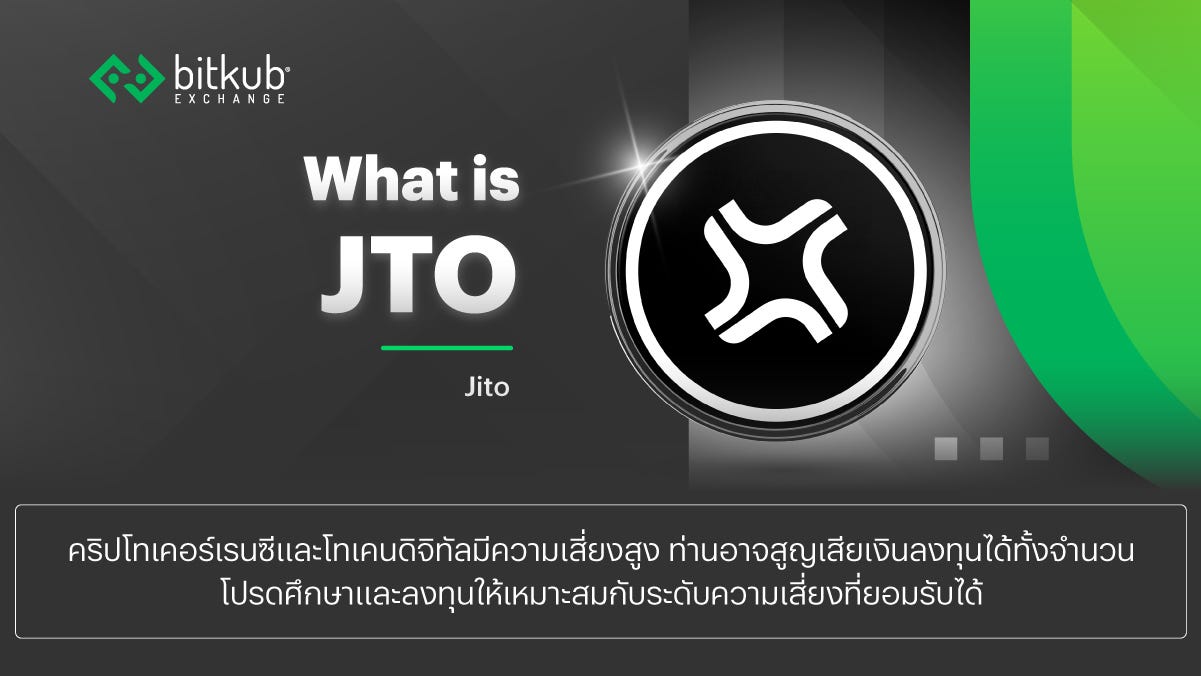
The Solana blockchain has quickly become a powerhouse for decentralized applications, thanks to its impressive speed and low transaction fees. At the forefront of its rapidly evolving ecosystem is Jito, a liquid staking protocol that stands out by tackling one of blockchain’s most intricate challenges: Maximal Extractable Value (MEV). Jito doesn’t just make staking more efficient; it introduces a unique way to share MEV profits with its users, making it a pivotal player for crypto enthusiasts and anyone curious about the cutting edge of DeFi.
What is Jito (JTO)?
Jito is a liquid staking protocol built on the Solana network. It allows you to stake your Solana (SOL) tokens and get JitoSOL in return. Unlike traditional staking where your assets are locked up, JitoSOL is a Liquid Staking Token (LST). This means it represents your staked SOL and its earned rewards, yet it remains fully accessible for use across various decentralized finance (DeFi) protocols on Solana. You can leverage your JitoSOL for lending, borrowing, providing liquidity, and yield farming, essentially allowing your capital to earn multiple layers of yield simultaneously.
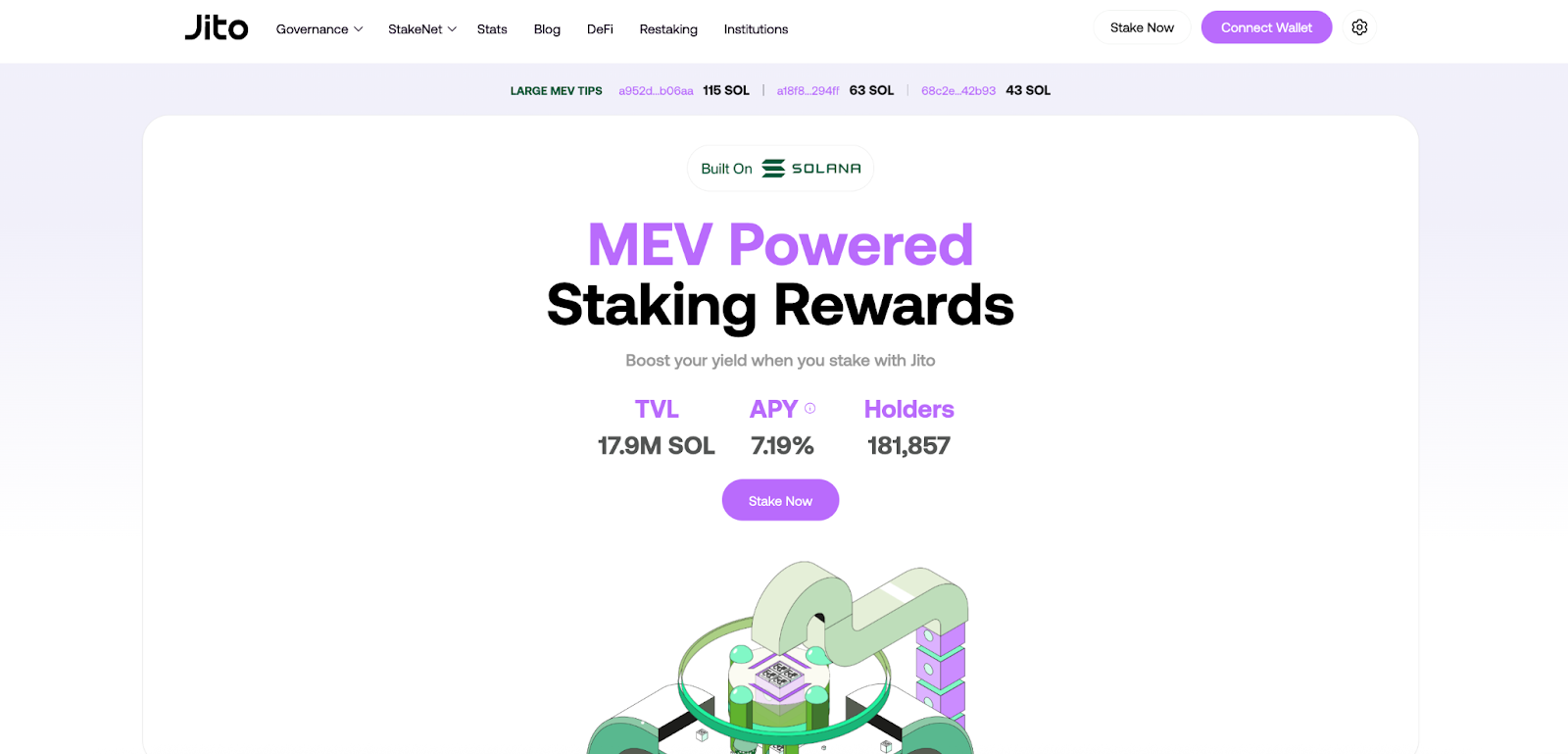
Jito’s Standout Features
Jito’s most compelling features largely revolve around its innovative approach to MEV and its unwavering commitment to decentralization:
— MEV Optimization and Distribution: This is arguably Jito’s most distinctive characteristic. MEV refers to the profit validators can extract by strategically reordering, including, or excluding transactions within a block. On Solana, this often leads to network congestion. Jito addresses this by implementing an auction-based system where “searchers” (arbitrageurs, liquidators) bid for the right to include profitable transaction sequences. A portion of these MEV profits is then redistributed to JitoSOL holders, offering an additional yield layer beyond standard staking rewards. This system aims to reduce network spam caused by aggressive MEV front-running attempts.
— Liquid Staking with JitoSOL: The liquid nature of JitoSOL offers unparalleled capital efficiency. Instead of tying up your SOL, you get a token that continues to accrue staking and MEV rewards while remaining usable in Solana’s dynamic DeFi landscape. The exchange rate of JitoSOL to SOL continuously increases as rewards accumulate, automatically compounding value for holders.
— Decentralization via StakeNet: Jito is dedicated to fostering a more decentralized Solana network. Its StakeNet program intelligently delegates staked SOL to a diverse set of high-performing validators, preventing stake concentration and enhancing network robustness. This autonomous stake pool manager uses a Validator History Program and Steward Program to evaluate and rank validators, ensuring optimal stake allocation.
— Reduced Network Congestion: By introducing an efficient MEV auction mechanism, Jito helps mitigate the “spam” transactions that can arise from MEV capture attempts, thereby contributing to a smoother and more efficient Solana network.

Who Founded Jito?
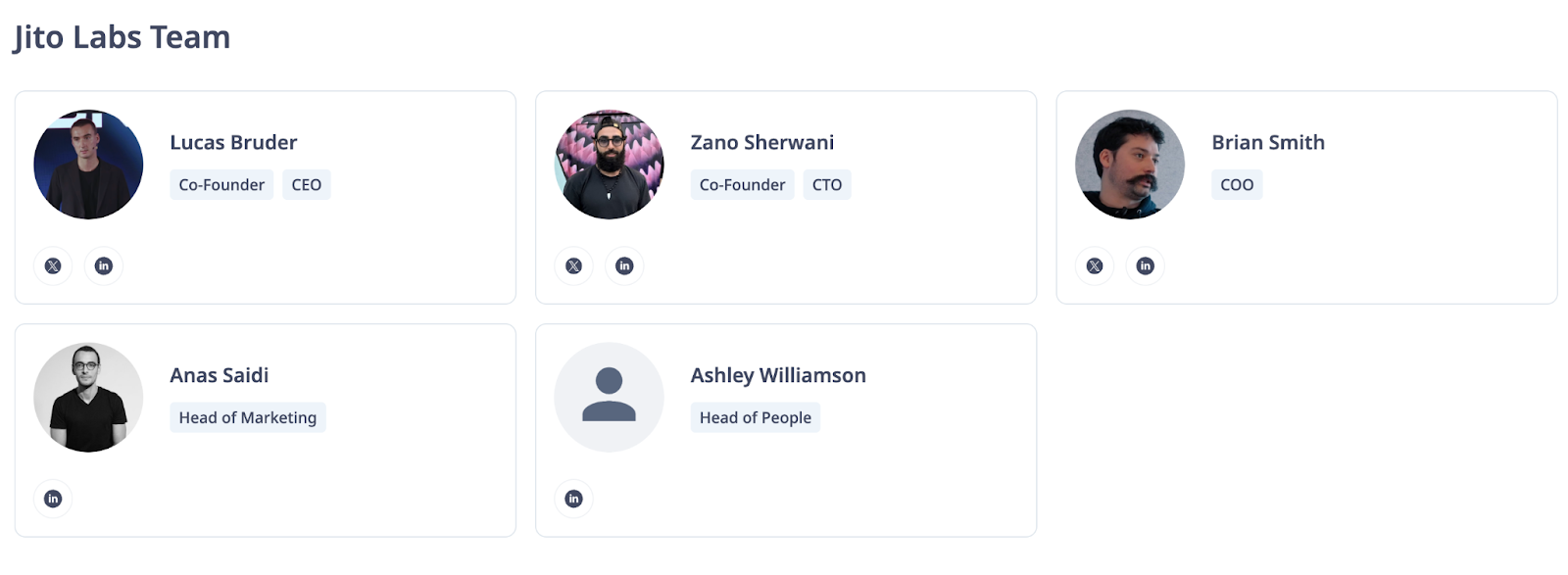
Jito was co-founded by Lucas Bruder and Zano Sherwani. Their vision for Jito grew from recognizing the significant potential of MEV within rapidly expanding blockchain networks like Solana, and a strong desire to build infrastructure that optimizes its capture and distribution for the benefit of both stakers and overall network health.
What is the JTO Token?
The JTO token serves as the native governance token for the Jito Network. It empowers its holders to participate directly in the decentralized governance of the protocol. This includes:
— Setting fees: JTO holders can vote on the fee structure of the JitoSOL stake pool.
— Updating delegation strategies: They have a say in how SOL is delegated to validators through the StakeNet programs.
— Treasury management: JTO holders manage the treasury of JTO tokens held by the Jito DAO.
— Protocol development: They contribute to the ongoing growth and improvement of Jito’s various products and protocols.
In essence, JTO tokens give community members a voice in shaping the future direction and policies of the Jito Network.
Token Allocation and Tokenomics
The JTO token has a total supply capped at 1,000,000,000 JTO. The allocation strategy is designed to promote community growth, ecosystem development, and reward early contributors and investors, with vesting schedules in place to ensure long-term alignment.
Key allocations include:
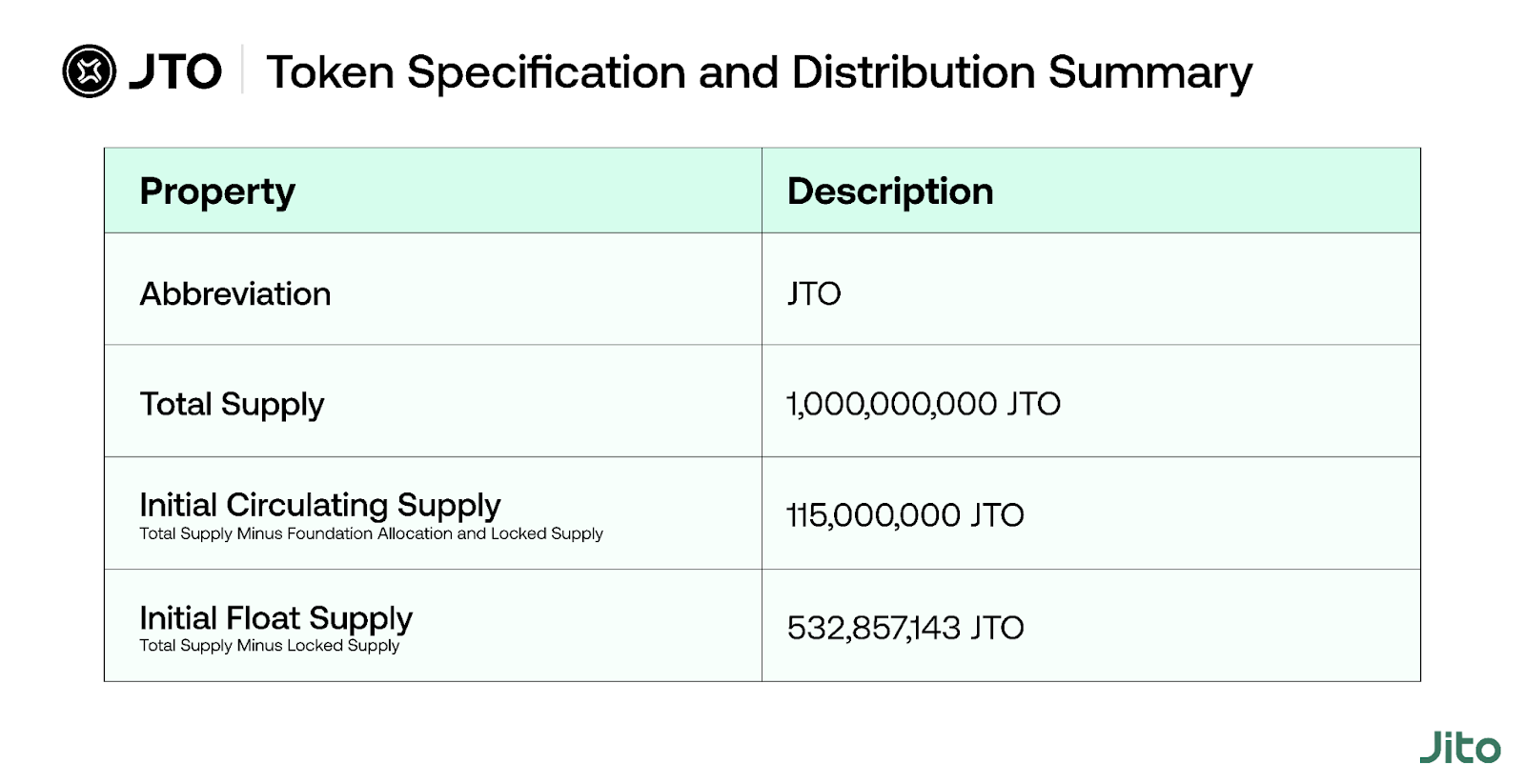
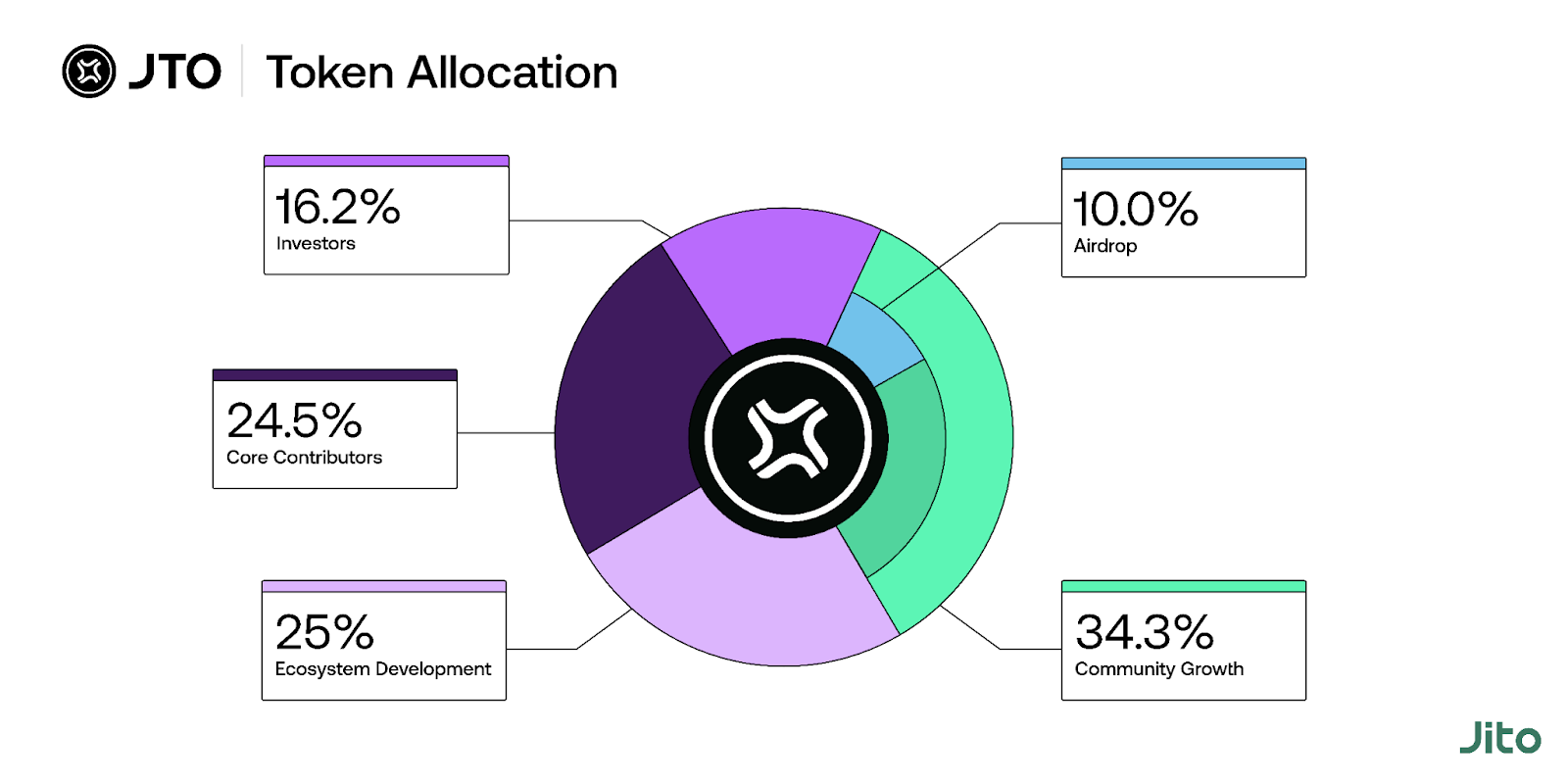
— Community Growth: Approximately 34.3% of the total supply is dedicated to fostering the Jito community. This includes an initial retrospective airdrop of 10% to early users and contributors, with the remainder controlled by DAO governance for future initiatives.
— Ecosystem Development: Around 25% of the supply is allocated to fund communities and contributors driving the expansion of Jito’s protocol on Solana, including advancements like StakeNet.
— Core Contributors: Approximately 24.5% is allocated to Jito’s founders, current and future employees, and early contributors to the ecosystem. These tokens typically have vesting schedules, often with a 1-year cliff and linear unlocking over 2–3 years.
— Investors: Roughly 16.2% is allocated to investors who supported Jito’s early development. These tokens also follow a similar vesting schedule to core contributors, with a 1-year cliff and linear unlocking over 2–3 years.
The tokenomics aim to cultivate a sustainable and decentralized ecosystem where stakeholders are incentivized to contribute to the network’s long-term success. Token releases are staggered through vesting periods, which helps prevent large sell-offs and promotes the gradual decentralization of governance power.
JTO Price Snapshot
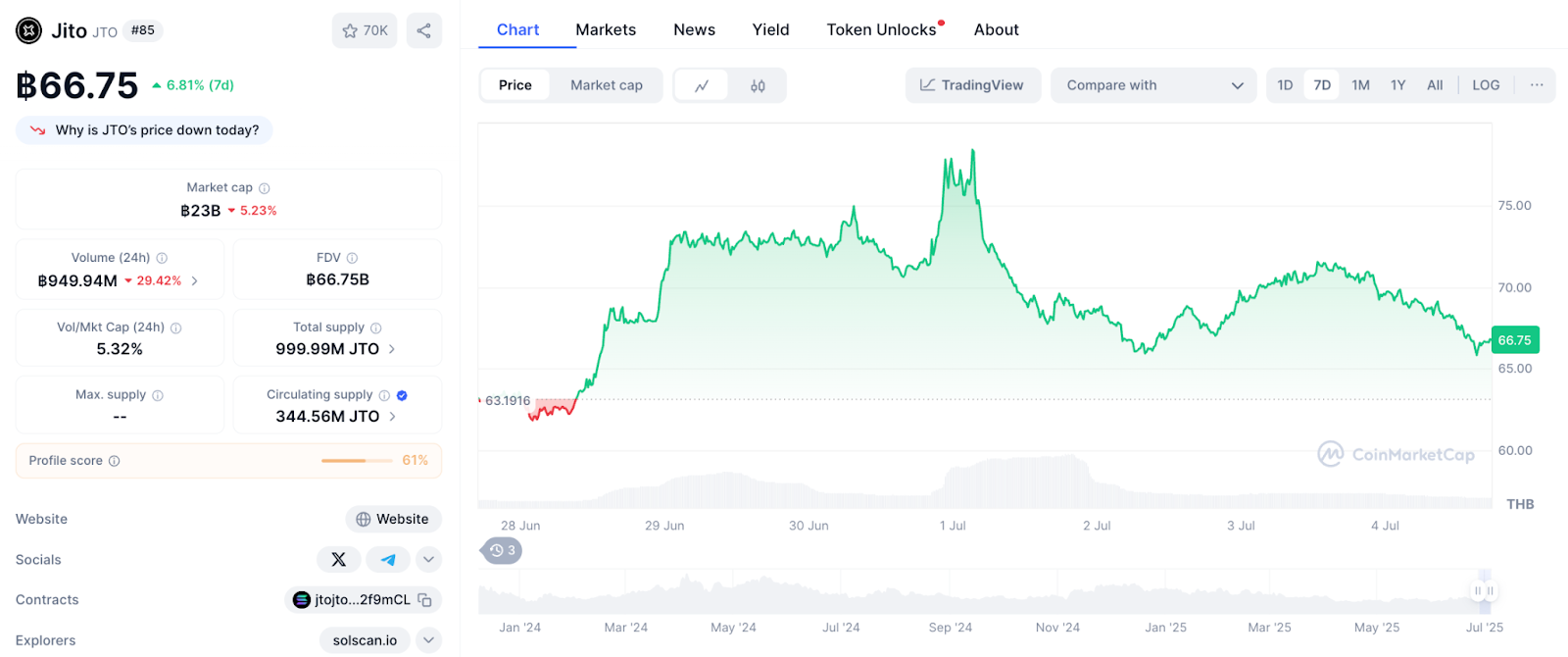
As of Friday, July 4, 2025, at 5:49 PM +07, according to CoinMarketCap, the JTO token has a market capitalization of $711,433,258 USD.
Currently, JTO is trading at approximately $2.06 USD per JTO. It reached its all-time high of $5.61 USD per JTO on December 7, 2023.
Reference: Jito Network Docs, CoinMarketCap
— — — — — — — — — — — — — — — — —

New to crypto? Learn the ropes with our beginner’s guide, ‘Crypto Knowledge for beginners’. When you’re ready, take the next step and start trading today at Bitkub Exchange. Click here to apply!
— — — — — — — — — — — — — — — — —
Disclaimer:
— Cryptocurrency and digital tokens involve high risks; investors may lose all investment money and should study information carefully and make investments according to their own risk profile.
— Past Returns does not guarantee future returns/performance.
ที่มา:
Medium